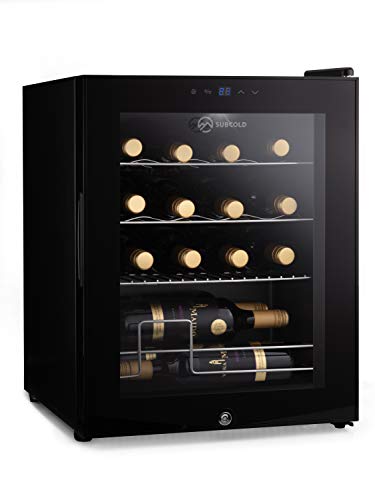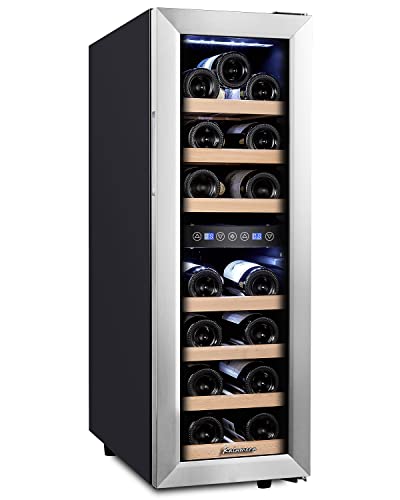The Advanced Guide To Beer And Wine Refrigerator
페이지 정보

본문
 Choosing a Beverage and Wine Refrigerator
Choosing a Beverage and Wine RefrigeratorThis dual-zone refrigerator is ideal for cooling and storing both beer and wine. It can be freestanding or built-in and has a sleek seamless door that looks great in any space.
 Although vibrations are generally innocuous however, they can cause disturbance to the sediment inside a bottle, and trigger chemical reactions that may not be apparent. This can alter the taste and reduce esters over time.
Although vibrations are generally innocuous however, they can cause disturbance to the sediment inside a bottle, and trigger chemical reactions that may not be apparent. This can alter the taste and reduce esters over time.Humidity Control
Humidity refers to the amount of water vapor that is present in the air. It varies throughout the day based on a variety of factors. Temperature as well as precipitation, wind, and other environmental conditions can dramatically affect humidity levels. Keeping humidity at optimal levels is essential for a variety of reasons. Humidity can affect weather patterns, indoor air and even slim wine refrigerator storage. The aromatic compounds that are present in wine are affected by humidity changes. The taste of a wine can be affected by excessive humidity. It can alter the balance of these aromatic compounds. A wine refrigerator can help to maintain the right humidity level to preserve a bottle's taste.
A wine refrigerator can aid in preventing the deterioration of corks and ensure that the seal is in good condition. If humidity is too low, corks may dry out and allow oxygen to enter the bottle, speeding up the aging process and tainting the wine's taste. A wine refrigerator can help maintain the humidity level between 55% and 65%.
Wine coolers are also a great option to store wine and beer. A wine cellar is designed for long-term storage. Many of them have a dedicated space for beer bottles, meaning you can keep your favorite craft beers and lagers in the same location as your most cherished wines. They also have effective designs that regulate temperatures and humidity to avoid condensation that could damage labels or packaging.
Most models come with the hygrometer, which lets you monitor the humidity level of your wine cooler and adjust it to suit your needs. You can also use a humidifier in your wine refrigerator to boost the humidity.
If you opt to use a wine refrigerator mini refrigerator, place the dehumidifier inside a room apart from it. This will stop the dehumidifier from absorbing any of the wine or beer you store in the refrigerator. If you plan to keep your wine for a long duration, controlling humidity is essential. For a brief period of time, you may not notice any changes in your wine. However, over months or years the absence of humidity can significantly alter the flavor profile of your preferred wines.
Vibration Absorption
The vibrations in the wine fridge may hinder the natural aging of the stored wines. Even tiny vibrations can cause sediment to move in the bottle, triggering complicated chemical reactions that can reduce esters and dull the wine's flavor as time passes. All La Sommeliere units have a vibration absorption system that helps reduce vibrations and noise, allowing your wine to age in peace and properly.
Aside from the fact that wine coolers usually emit less sound than conventional refrigerators, they're susceptible to noise issues due to the arrangement of fans and refrigerant circuits found in most units. It is crucial to follow the clearance guidelines and place your wine cooler in a quiet space far from any other sources of noise.
Additionally, it is also recommended to clean your wine cooler using an agent that is non-abrasive and to allow the unit to "air out" prior to loading it with bottles. This will minimize dust and dirt that can build up in the air vents.
Finally, if you notice that your wine fridge is making a lot of noise, it could be because of an electric fan that is not working properly or compressor. The compressor is typically located behind the wine refrigerator. If it is not placed properly or bumps against something behind it, the rubber mounts can be shaken loose and cause loud humming noises.
The compressor wine cooler functions like a standard fridge by compressing air molecules electronically, which decreases their temperature. They then blow across the interior of your fridge. This type of cooling is more energy-efficient than other cooling methods, such as evaporator or frost-free refrigerators. Compressor wine coolers are noisy and require regular maintenance. Because of this, many consumers opt to buy thermoelectric wine coolers that don't make use of compressors.
Temperature Control
Like wine, beer has specific temperature requirements that help it keep its optimal flavor. It is important to select a wine and beverage refrigerator that has adjustable temperature controls. This allows you to keep your drinks at the ideal temperature for serving and storage for each type. You can also find dual zone models that provide a separate temperature zone for wine bottles, and separate temperature zones for other beverages or beer.
In general, the majority of beer styles prefer to be served colder than wine. The ideal temperature to serve a particular style will depend on the kind and the method of making it. Wheat beers and pilsners ought to be served between 40 and 50 degrees Fahrenheit. IPAs, barleywines and stronger ales are best served between 50 and 55 degrees Fahrenheit. If you let your beer warm too long it will begin to create a sour "skunky" smell that can make drinking unpleasant.
When it comes to wine, you'll want to choose a refrigerator with an appropriate temperature range to accommodate your preferred whites, reds, and sparkling wines. Some wine refrigerators even include humidity control features that can help stop oxidation and keep the cork in good condition. Some wine refrigerators even come with a UV-blocking glass specifically designed to keep sunlight from damaging the wine and causing it to age prematurely.
The temperature control system in a refrigerator is powered by thermoelectric cooling or compressor technology. Compressor-powered units use vapor compression to lower temperatures inside the wine refrigerator while thermoelectric models rely on electronic convection fans that circulate cool air through the refrigerator. For the best results, many fridges combine these technologies.
If you're considering buying a beverage and wine fridge which uses compressor technology, you should consider buying one with shock pads that are vibration-resistant. The vibrations generated by compressor-related operations could disrupt the maturation process of wine chiller under counter and speed up the process of oxidation.
You can purchase a wine chiller under counter-specific refrigerator. However, it might be more affordable to purchase an ordinary fridge or regular fridge with a spacious interior and shelves that can be moved. You can also customize the space to accommodate the various varieties of wine, beer, as well as other bottles and cans.
Storage Options
If you are a fan of hosting parties and have a wide range of drinks to serve you should consider a cooler for your drinks. These refrigerators can store cans and bottles of wine and beer along with other ice cold beverages like water and soda. They're available in freestanding and built-in models. Built-in models can be integrated into cabinets or under counters in kitchens with small space.
The two types of refrigerators are available in a broad range of sizes and styles, making them suitable for homes with a variety of. Find models with sliding shelves that allow you to easily locate your favorite brews and vinos. Some refrigerators have soft LED lighting that highlights your selection in a subtle glowing, soft glow. Some refrigerators even include a humidity control function. This feature can in preventing the formation of frost in your wine or beer bottles, ensuring that you can enjoy your favorite beverages without worrying about a buildup of frost.
Dual-zone refrigerators can store your favorite wines at the optimal temperature for serving. You can also utilize the separate zones to store your craft beer since it typically has the same ideal temperature ranges to an wine bottle. A dual zone wine and beer refrigerator can also hold larger bottles of beer or spirits than a regular household fridge.
Keep your wine and beer in an area with adequate light protection. The proper conditions will prolong their lifespan. Keep the refrigerator free of odors and dust that could affect the taste of your beverages.
If you're storing a Large wine Chiller collection of wine and wish to keep their quality, you should consider the cellar refrigerator. This kind of refrigerator is made to be used for long-term storage. It operates at a slightly higher temperature than a wine refrigerator, which allows your bottles to get older and develop their best taste. A cellar refrigerator also has humidifiers that keep the proper humidity level. This helps to ensure that the cork remains moist and impermeable, preventing external air and food items from getting into your wine bottle and deteriorating its quality over time.
- 이전글Say "Yes" To These 5 Squirting Dildo Uk Tips 24.09.20
- 다음글See What Situstoto Slot Tricks The Celebs Are Using 24.09.20
댓글목록
등록된 댓글이 없습니다.

